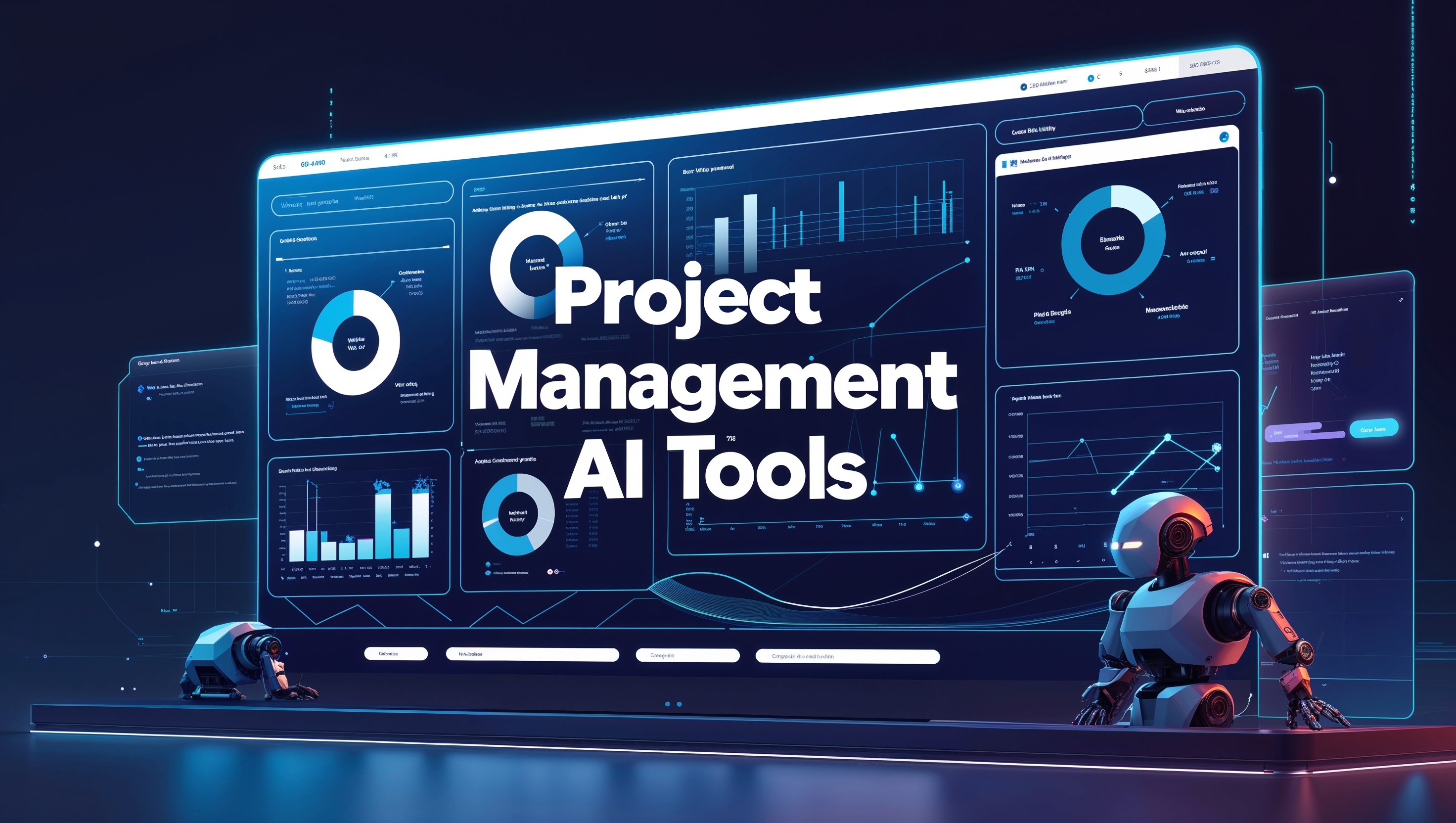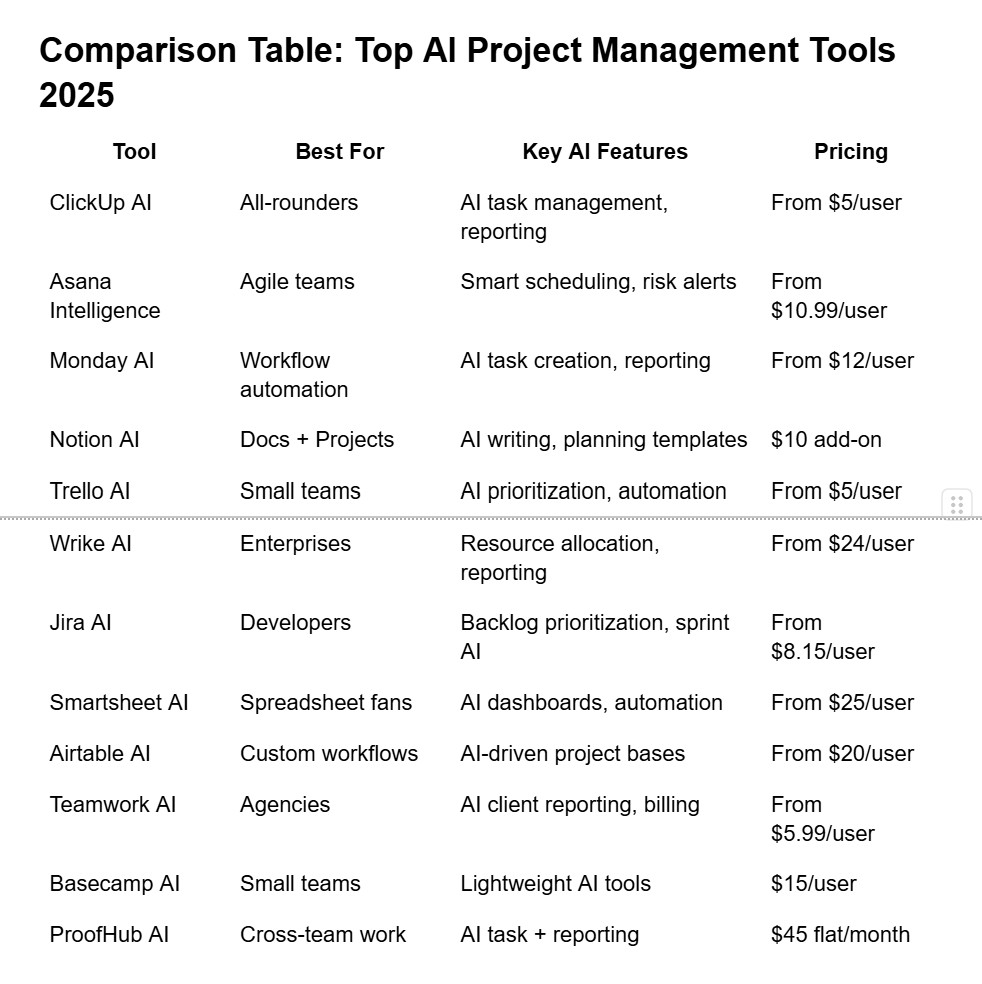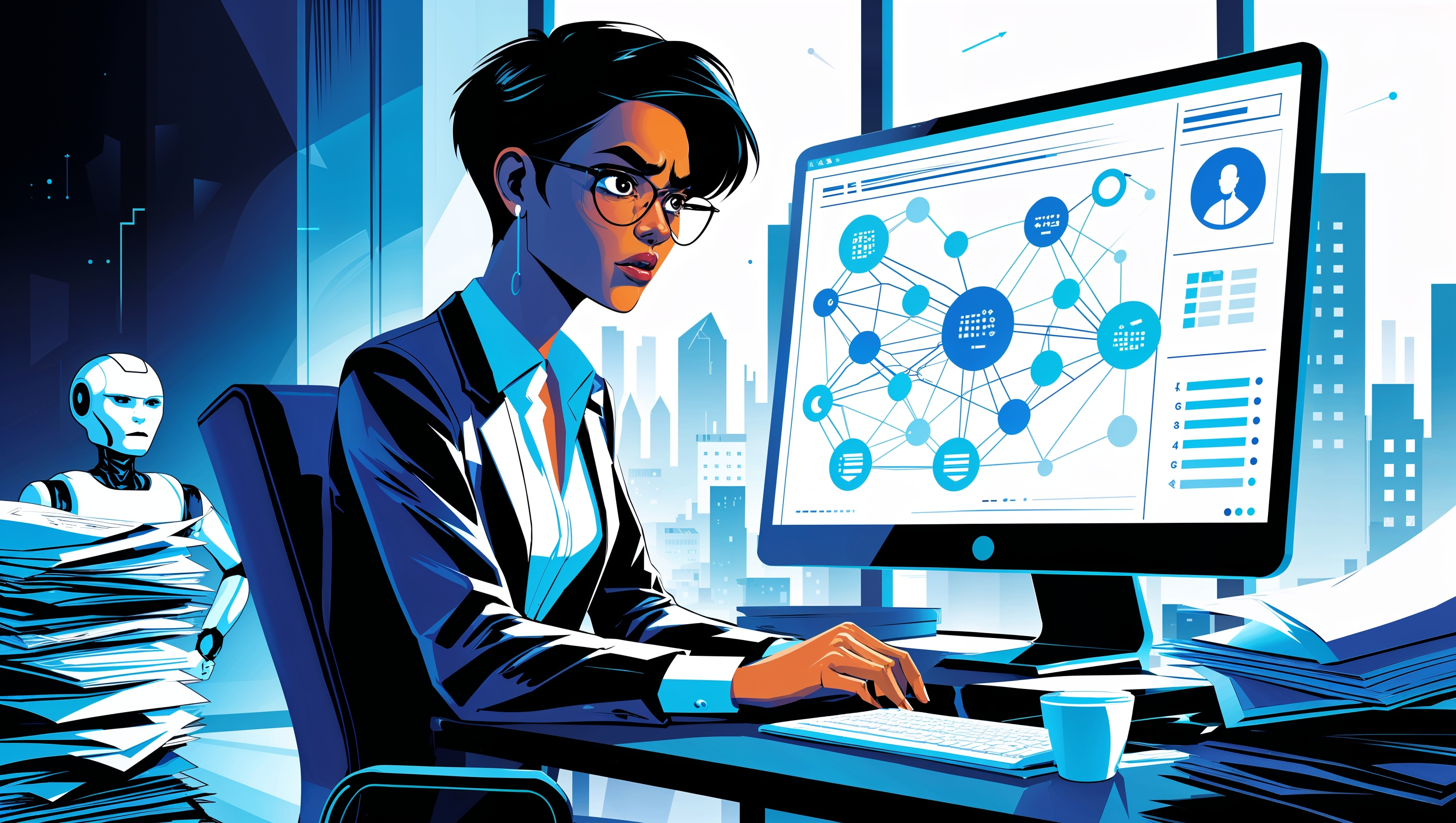Project Management AI Tools: Best Software, Features, and Comparisons for Smarter Team Productivity in 2025

Project management AI tools are transforming the way teams plan, execute, and deliver projects in 2025.
Unlike traditional task management platforms, these AI-powered solutions bring automation, smart scheduling, and intelligent insights into everyday workflows.
With best AI project management software now capable of handling resource allocation, task prioritization, and automated reporting, project managers are finding new ways to save time and enhance team collaboration.
The rise of AI tools for task management means repetitive, manual work—like updating progress, tracking dependencies, or sending reminders—can be offloaded to automation, freeing managers to focus on strategy and leadership.
From AI productivity tools for project managers to smart scheduling AI tools for projects, the market is filled with options tailored for different industries and team sizes.
This article explores the features, benefits, and limitations of project management AI tools, offering expert insights to help you choose the right solution.
2. What Are Project Management AI Tools?
Project management AI tools are software platforms enhanced with artificial intelligence to streamline and optimize project workflows.
They go beyond basic task trackers by offering intelligent project tracking tools that analyze progress, predict delays, and provide actionable recommendations for keeping teams aligned.
At their core, these solutions function as AI project management assistants, integrating machine learning, natural language processing, and predictive analytics to automate repetitive processes like scheduling, reporting, and task assignment.
For example, AI tools for resource allocation can scan team availability, workload, and project deadlines to suggest the most efficient distribution of tasks.
Smart scheduling AI tools for projects also remove the guesswork by automatically adjusting calendars to accommodate shifting priorities and dependencies.
AI productivity tools for project managers offer dashboards that not only show the current status but also anticipate bottlenecks before they become critical issues.
AI workflow automation platforms extend functionality by connecting with email, Slack, and CRMs, allowing seamless updates across different systems without manual entry.
These innovations are designed to increase efficiency, reduce errors, and empower managers to make data-driven decisions.
Instead of wasting hours on administrative work, project leaders can rely on intelligent algorithms to provide clarity, save time, and improve accuracy in execution.
3. Key Features of AI in Project Management
AI in project management is defined by features that transform productivity from reactive to proactive.
One of the most valuable features is AI task prioritization software, which analyzes workload, deadlines, and dependencies to suggest the order of execution.
AI tools for task management also help track progress in real time, eliminating the need for manual updates.
Automated reporting tools with AI generate performance summaries, milestone updates, and stakeholder reports in minutes rather than hours.
Smart scheduling AI tools for projects adjust calendars dynamically when team members are unavailable or deadlines shift.
AI tools for agile project management support sprints by providing backlog prioritization and retrospective analysis powered by data-driven insights.
AI apps for team coordination ensure that communication flows smoothly by sending reminders, aligning tasks, and integrating across platforms like Slack and Microsoft Teams.
AI planning tools for teams also highlight risks and provide scenario modeling, so managers can evaluate outcomes before committing resources.
- AI-powered team collaboration tools foster transparency through real-time dashboards.
- Intelligent project tracking tools forecast risks and recommend corrective measures.
- AI workflow automation platforms connect disparate systems to maintain data consistency.
These features are why the best AI project management software in 2025 is increasingly viewed as essential, not optional.
By reducing repetitive work, improving accuracy, and enabling predictive insights, project management AI tools empower teams to focus on strategic growth and innovation instead of daily administrative tasks.
4. Top 12 Project Management AI Tools in 2025
1. ClickUp AI
ClickUp has long been one of the best AI project management software platforms, and its AI integration makes it even more powerful for 2025. With smart task prioritization, AI-generated summaries, and workflow automation, it is popular among both startups and enterprises.
Top Features
- AI tools for task management with contextual recommendations
- Automated reporting tools with AI for stakeholder updates
- AI-powered team collaboration tools with real-time dashboards
Pricing: Free plan available; AI add-on from $5 per user/month.
2. Asana Intelligence (AI-Powered Asana)
Asana’s AI upgrade delivers predictive task management and workflow automation, helping managers eliminate bottlenecks and forecast delays before they occur. It’s widely adopted by agile teams looking for intelligent project tracking tools.
Top Features
- AI project management assistant for progress insights
- Smart scheduling AI tools for projects with predictive calendars
- Automated risk detection with data-driven alerts
Pricing: Premium from $10.99/month; AI features included in Business plan.
3. Monday.com AI
Monday.com now integrates AI workflow automation platforms, allowing managers to automate repetitive updates, generate project documentation, and manage dependencies more efficiently.
Top Features
- AI productivity tools for project managers with natural language prompts
- Automated reporting tools with AI for weekly reviews
- AI apps for team coordination across boards
Pricing: Free for individuals; AI Pro plan from $12/user/month.
4. Notion AI
While best known for note-taking, Notion AI has become a go-to for project planning, offering AI planning tools for teams and AI-driven productivity platforms for small businesses and freelancers.
Top Features
- AI content creation for project documentation
- AI tools for agile project management with templates
- Intelligent task recommendations based on previous workflows
Pricing: AI add-on $10/month; free base plan available.
5. Trello AI (Atlassian)
Trello’s AI assistant enhances its kanban boards with AI task prioritization software and workflow automation. It’s an excellent choice for visual thinkers and smaller teams.
Top Features
- AI-powered task prioritization and smart card suggestions
- AI workflow automation platforms with Butler AI
- Predictive workload balancing
Pricing: Free plan; Premium from $5/user/month.
6. Wrike AI
Wrike stands out for enterprise-grade project management, with AI-driven productivity platforms that handle resource allocation, automated reporting, and large-team coordination.
Top Features
- AI tools for resource allocation and team utilization
- Automated reporting tools with AI for executives
- AI task prioritization with project-level insights
Pricing: Free basic plan; Enterprise AI starts from $24/user/month.
7. Jira AI (Atlassian Intelligence)
Jira has evolved into one of the most advanced AI tools for agile project management. Its AI capabilities offer backlog prioritization, sprint forecasting, and automated reporting.
Top Features
- AI project management assistant for sprint planning
- Intelligent project tracking tools with risk forecasting
- AI-powered team collaboration tools across dev teams
Pricing: Standard from $8.15/user/month.
8. Smartsheet AI
Smartsheet integrates AI planning tools for teams that prefer spreadsheet-style project management but need AI for automation, reporting, and insights.
Top Features
- AI workflow automation platforms integrated into sheets
- AI task prioritization software with conditional logic
- Automated reporting tools with AI for dashboards
Pricing: Business plan starts at $25/user/month.
9. Airtable AI
Airtable combines database flexibility with AI-powered project management, making it one of the most customizable AI productivity tools for project managers.
Top Features
- AI planning tools for teams with custom workflows
- AI apps for team coordination using bases
- Automated reporting tools with AI for projects across departments
Pricing: Free basic plan; AI add-on from $20/user/month.
10. Teamwork AI
Teamwork specializes in client-focused projects, and its AI task prioritization software ensures deadlines are met while optimizing profitability.
Top Features
- AI project management assistant tailored for agencies
- AI tools for resource allocation with billable hours tracking
- Automated reporting tools with AI for client transparency
Pricing: Free for freelancers; Paid plans from $5.99/user/month.
11. Basecamp with AI Integrations
Basecamp integrates AI through third-party apps, making it a lightweight but effective AI-driven productivity platform for smaller teams.
Top Features
- AI-powered communication tools for project updates
- Smart scheduling AI tools for projects with reminders
- AI planning tools for teams managing small-scale projects
Pricing: $15/user/month flat.
12. ProofHub with AI Features
ProofHub now incorporates AI apps for team coordination, offering enhanced note summarization, scheduling, and AI workflow automation platforms for teams.
Top Features
- AI task prioritization software for managers
- Automated reporting tools with AI for progress tracking
- Smart scheduling AI tools for projects with multiple teams
Pricing: Flat $45/month for unlimited users.
Comparison Table: Top AI Project Management Tools 2025

5. Benefits of Using Project Management AI Tools
AI project management tools offer measurable improvements across productivity, collaboration, and decision-making. The core benefit lies in their ability to transform raw project data into actionable insights without requiring manual input. Managers save hours weekly by automating repetitive updates, progress tracking, and reporting.
AI-powered team collaboration tools help project teams communicate more effectively by reducing the noise of endless updates. Instead of chasing scattered messages, AI filters what matters and summarizes key points for different stakeholders. Smart scheduling AI tools for projects add further efficiency by automatically reassigning deadlines and ensuring no resource is overbooked.
AI task prioritization software allows managers to focus on the highest-impact tasks. By using machine learning models, these platforms identify risks early, predict workload capacity, and streamline task allocation across teams. This reduces human error and keeps delivery cycles predictable.
Another strong benefit is resource allocation optimization. Intelligent project tracking tools analyze capacity across multiple projects and prevent burnout by distributing workloads more evenly. This helps reduce turnover in high-stress industries like software and marketing.
For executives, automated reporting tools with AI provide instant dashboards with metrics on velocity, risks, and profitability. Instead of spending hours gathering reports, decision-makers gain clarity in seconds. This enhances business agility and helps leaders pivot strategies faster.
- Faster decision-making with predictive analytics
- Improved productivity through automation of repetitive tasks
- Enhanced team collaboration using AI-powered integrations
- Reduced project risks with intelligent forecasting
AI tools also encourage consistency. With natural language processing, they generate project documentation, meeting notes, and even client updates with professional tone and minimal edits. Teams no longer waste time rephrasing or rewriting, which boosts overall efficiency.
In 2025, project managers adopting AI-driven productivity platforms report up to 30% faster project delivery and a 25% reduction in missed deadlines. This shift highlights the value of embedding AI not as an add-on, but as a core assistant for long-term planning and real-time execution.
6. Challenges of Project Management AI Tools

While the benefits are significant, AI project management software also presents challenges. One common issue is integration complexity. Many teams already rely on platforms like Slack, Google Workspace, or Microsoft Teams, and ensuring seamless AI workflow automation platforms fit smoothly can require custom setups.
Another challenge lies in data privacy and security. AI tools rely on sensitive project data, including client information and financial metrics. Organizations must ensure compliance with GDPR or HIPAA regulations when applicable.
Costs can also be a barrier. While some AI project management assistants in 2025 start as low as $5 per user/month, advanced features in enterprise tools like Wrike AI or Smartsheet AI can quickly scale into thousands annually. For small teams, this investment may outweigh perceived benefits.
- Learning Curve: Teams often struggle with adapting to AI task prioritization software. Training time and adoption costs must be factored in.
- Over-reliance on AI: Automated recommendations are only as good as the data fed into the system. Poor data quality can result in misleading insights.
- Customization limits: While AI apps for team coordination are improving, many still require manual tweaking to suit industry-specific needs.
AI also introduces cultural challenges. Employees accustomed to manual control may resist automation, fearing job replacement. Leaders must position AI not as a substitute for human judgment but as a tool for amplifying team potential.
Finally, transparency remains a concern. Some AI-powered team collaboration tools operate as “black boxes,” offering decisions without explaining the reasoning. This lack of clarity can reduce trust among users.
Despite these hurdles, most organizations find the advantages outweigh the risks. With careful training, security measures, and phased rollouts, AI-driven productivity platforms become sustainable long-term solutions.
7. Future Trends in AI for Project Management
The next wave of AI project management assistants will go beyond simple task automation. Emerging tools are incorporating predictive project simulations to test multiple execution scenarios before committing to a plan. This helps managers choose paths with the highest probability of success.
AI workflow automation platforms are also moving toward voice-activated project assistants. Instead of typing updates, project managers can ask AI tools to generate reports or reschedule meetings using natural speech.
Another trend is hyper-personalized recommendations. AI planning tools for teams will adjust based on individual work habits, automatically customizing schedules to match productivity peaks.
We’ll also see deeper integration with IoT devices. Intelligent project tracking tools may connect to wearable devices, flagging employee fatigue risks and recommending rest breaks to reduce burnout.
- Greater adoption of AI-driven productivity platforms across SMEs, not just enterprises
- AI task prioritization software that factors emotional intelligence into team coordination
- Automated reporting tools with AI becoming fully interactive, offering real-time Q&A dashboards
The market is also shifting toward affordable AI apps for team coordination. By 2027, experts predict at least 70% of SMBs will use some form of AI project management software compared to just 30% in 2022. This democratization will ensure even small teams enjoy enterprise-grade planning tools.
The combination of AI with blockchain for secure project data tracking is another potential evolution, ensuring transparent and tamper-proof audit trails.
8. Final Verdict: Should You Invest in Project Management AI Tools?
Project management AI tools have moved from being “nice-to-have” add-ons to essential productivity assistants in 2025. Their ability to optimize resource allocation, automate reporting, and enhance collaboration makes them indispensable for competitive organizations.
For large enterprises, platforms like Wrike AI, Jira AI, and Smartsheet AI provide unmatched scalability with AI workflow automation platforms designed for complex portfolios. Their cost may be high, but the ROI often outweighs it through faster project delivery and better client satisfaction.
For SMBs and freelancers, more affordable options like ClickUp AI, Notion AI, and Trello AI strike the right balance between usability and automation. These AI-powered team collaboration tools offer intelligent project tracking without overwhelming small teams with unnecessary complexity.
- Best for agile teams: Asana Intelligence, Jira AI
- Best for client-focused agencies: Teamwork AI, ProofHub AI
- Best for custom workflows: Airtable AI, Notion AI
Ultimately, the best AI project management software depends on your specific needs. If your organization struggles with missed deadlines, inefficient reporting, or overloaded teams, adopting AI task prioritization software can reduce friction and increase efficiency.
The future clearly points toward more AI-driven productivity platforms, and teams that delay adoption risk falling behind. Investing in the right AI planning tools for teams today positions businesses for smarter, faster, and more sustainable project success in 2025 and beyond.
FAQ: Project Management AI Tools (2025 Edition)
1. What are project management AI tools used for?
They help automate scheduling, reporting, task allocation, and collaboration by using artificial intelligence to reduce manual effort.
2. What is the best AI project management software in 2025?
Tools like Asana Intelligence, ClickUp AI, and Wrike AI are among the top-ranked due to their automation and predictive analytics.
3. Are AI tools for project management expensive?
Not always. Some platforms like Trello AI and Notion AI start as low as $5–$8 per user/month, while enterprise tools can cost hundreds per month.
4. Can AI project management tools replace human managers?
No, they support managers by automating repetitive work and offering insights, but human judgment is still essential for leadership and decision-making.
5. Are AI workflow automation platforms safe for sensitive project data?
Yes, but it depends on the provider. Most offer encryption and GDPR compliance, though businesses should verify security certifications.
6. How do AI-powered team collaboration tools help remote teams?
They summarize updates, auto-schedule meetings across time zones, and reduce email overload, making communication smoother for distributed teams.
7. Which industries benefit most from AI project management assistants?
Software development, marketing agencies, consulting, and remote-first companies see the biggest gains from automation and intelligent scheduling.
